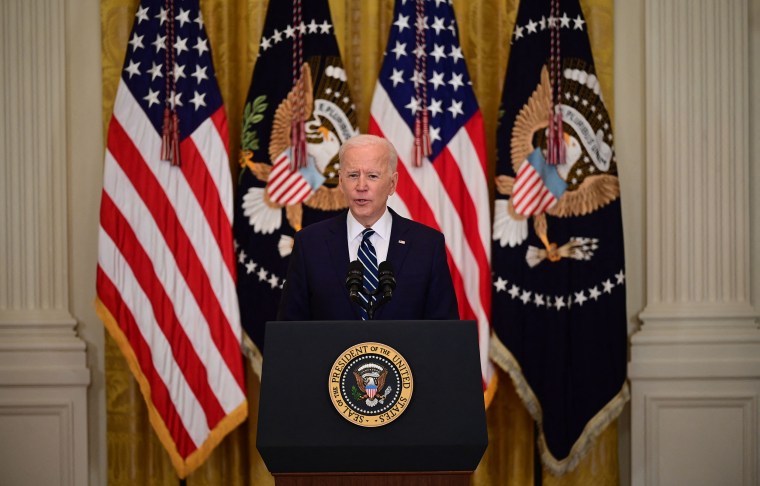When President Joe Biden took the podium Thursday at his first presidential news conference, it was clear that this was a different kind of event than what we’d been conditioned to expect when “the last guy” — as Biden frequently used to refer to former President Donald Trump — was in office.
Biden is thinking about the arc of the next four years. The only problem is that the press hasn’t yet shifted in response.
As Biden took his time shuffling between his notecards filled with facts and figures prepared by his staff, I was reminded how the Trump news cycle was charted in seconds, as the mercurial president changed his mind on a dime, tossing out wild lies like a boxer throws haymakers. He only saw the next 30 seconds ahead of him, and his answers often reflected that.
Biden is thinking about the arc of the next four years. The only problem is the press hasn’t yet shifted in response.
That was clear on both sides of the East Room podium where Biden took questions from the attending members of the White House press corps. On question after question, the journalists in the room tried to make news, most hammering away at the story leading the current news cycle, the situation on the southern border. But unlike Trump, Biden wouldn’t bite. He responded to each frantic inquiry by giving thoughtful, substantive answers in place of drama.
That’s not to say Biden was boring; he joked about having been elected to the Senate over 120 years ago. He also kiddingly said he missed Trump, ribbing him on just how soon his predecessor began to run for re-election. But when confronted with, well, malarkey, he decided to focus on the big picture.
Case in point: Biden opened the presser with news that his administration would now aim for 200 million doses of the Covid-19 vaccine administered within his first 100 days in office. Still, the vast majority of the questions focused on the border.
On some levels that makes sense: The situation down in Texas is the biggest piece of negative news that the administration is handling, making it an easy topic for the sort of adversarial questioning that many critics said was lacking when dealing with Trump.
Biden showed in Thursday’s press conference that he’s not going to be hyper-focused on the crisis of the hour, or even day.
Immigration is also the most apparent point of contention between Democrats and Republicans at the moment, which provides the opportunity to draw out GOP responses to whatever Biden might say, to keep the story’s momentum going. And the unaccompanied minors who have been crowded into U.S. Customs and Border Protection facilities add a human element to the story that is lacking on, say, infrastructure.
But there were also questions on whether Biden is moving closer to supporting abolishing the filibuster (sort of); whether Biden will run again in 2024 (he expects to); and if Vice President Kamala Harris will still be his running mate if he does (uh, yes?). Biden seemed to deal with those gamely, though his frustration was clear at times.
But the president saved his best answers for the questions that weren’t really asked. When confronted with whether he intended to keep any of Trump’s tariffs and how to best confront China, he emphasized that the competition between Washington and Beijing would come down to who wins out as the two countries put forward their values on human rights and freedom.
“I imagine your children and grandchildren will be doing their thesis on who succeeded: autocracy or democracy,” Biden said. “Because that’s what’s at stake.”
When asked about how soon his potential gun control proposals would be released, and which of them he’d be selecting, Biden gave what was the most interesting response of the day: “All of the above. It’s a matter of timing. As you’ve all observed, successful presidents better than me have been successful because they know how to time what they’re doing. Order it and time priorities, what needs to be done.”
With that, he went off on a tangent about the need to invest in American infrastructure, previewing the multitrillion-dollar plan he’s set to unveil fully in Pittsburgh next week. It’s a decidedly unsexy topic — but a more important one than whether he’s expecting to face off against Trump again in 2024.
Unlike Trump, Biden wouldn’t bite. He responded to each frantic inquiry by giving thoughtful, substantive answers in place of drama.
I’ve been watching Ken Burns’ multipart documentary on the Roosevelts these last few days. And I saw something of Franklin Delano Roosevelt in Biden’s responses — not just for the size of the policies he’s championing, but because one of FDR’s greatest skills as a politician and leader was to know when to hit the gas on a policy, when to pump the breaks and how to wait for the right moment to strike a deal.
Biden showed in Thursday’s news conference that he’s not going to be hyperfocused on the crisis of the hour, or even of the day. He’s both zeroed in on his next task — in this case, infrastructure — and looking down the road to what the end goal is for his presidency.
"When I took office, I decided that it was a fairly basic, simple proposition," Biden said. "And that was that I got elected to solve problems." He later added, "I can’t guarantee we’re going to solve everything. But we can make it better."
It’s a proposition that manages to both sound completely doable and like one of the biggest challenges a president has faced. Thursday was meant to be a test of Biden and how he responded to the press’s interrogation under pressure. After watching that performance from the president, I came away having learned way more from what Biden chose to focus on than from the questions he was asked.

